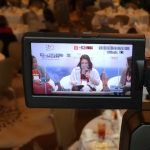As educators, they tend to have a precise definition of the term, said Sally De-Bolt, AMLE’s director of meetings and events.
But for the past two years, DeBolt has been organizing groups that meet online, using Google+ Hangouts, to talk about topics related to the institutes, which are a smaller, highly focused adjunct to AMLE’s annual conference. The online meetings, which span more than six months, speak to the most basic question underlying the flipped-learning concept: How do you combine virtual and face-to-face experiences for maximum impact?
The conversations are led by subject-matter experts representing a variety of educational institutions and job roles; faculty for AMLE’s summer institutes also meet using Google+ Hangouts. The online meetings have been successful in engaging participants, shaping agendas, and preparing attendees for the summer meetings, said DeBolt, who measures their success in part by the big jump in Hangout participation that occurred between the first and second years the program was implemented.
DeBolt also notes the quality of connections that the video platform creates among participants. “There might be a topic that is emotional for a participant,” but it’s hard to interpret that tone on a conference call or via Twitter, DeBolt said. “People love the peer-to peer connection of the small group. There’s the sense that attendees have a network of comrades. We do tons of webcasts and podcasts, and for the right groups, they serve a fantastic purpose. But in terms of truly connecting people, it’s just not the same.”



